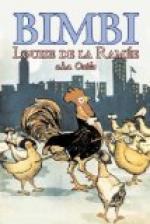He did not pray; praying in the morning had been no use; but he trusted in God, and he labored hard, toiling to and fro, seeking in every nook and behind each stone, and straining every muscle and nerve, till the sweat rolled in a briny dew off his forehead, and his curls dripped with wet. At last, with a scream of joy, he touched some soft close wool that gleamed white as the white snow. He knelt down on the ground, and peered behind the stone by the full light of his lantern; there lay the little lambs—two little brothers, twin brothers, huddled close together, asleep. Asleep? He was sure they were asleep, for they were so silent and still.
He bowed over them, and kissed them, and laughed, and cried, and kissed them again. Then a sudden horror smote him; they were so very still. There they lay, cuddled close, one on another, one little white head on each little white body—drawn closer than ever together, to try and get warm.
He called to them; he touched them; then he caught them up in his arms, and kissed them again, and again, and again. Alas! they were frozen and dead. Never again would they leap in the long green grass, and frisk with each other, and lie happy by Katte’s side; they had died calling for their mother, and in the long, cold, cruel night only death had answered.
Findelkind did not weep, or scream, or tremble; his heart seemed frozen, like the dead lambs,
It was he who had killed them.
He rose up and gathered them in his arms,—and cuddled them in the skirts of his skeepskin tunic, and cast his staff away that he might carry them, and so, thus burdened with their weight, set his face to the snow and the wind once more, and began his downward way.
Once a great sob shook him; that was all. Now he had no fear.
The night might have been noonday, the snow storm might have been summer, for aught he knew or cared.
Long and weary was the way, and often he stumbled and had to rest; often the terrible sleep of the snow lay heavy on his eyelids, and he longed to lie down and be at rest, as the little brothers were; often it seemed to him that he would never reach home again. But he shook the lethargy off him and resisted the longing, and held on his way: he knew that his mother would mourn for him as Katte mourned for the lambs. At length, through all difficulty and danger, when his light had spent itself and his strength had well nigh spent itself too, his feet touched the old highroad. There were flickering torches and many people, and loud cries around the church, as there had been four hundred years before, when the last sacrament had been said in the valley for the hunter-king in peril above.
His mother, being sleepless and anxious, had risen long before it was dawn, and had gone to the children’s chamber, and had found the bed of Findelkind empty once more.
He came into the midst of the people with the two little lambs in his arms, and he heeded neither the outcries of neighbors nor the frenzied joy of his mother: his eyes looked straight before him, and his face was white like the snow.




